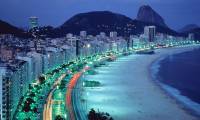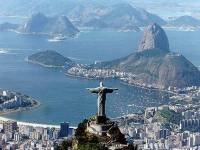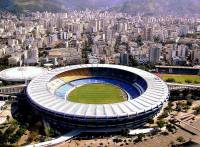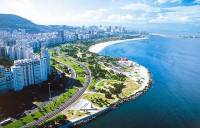Brazil - the
largest in area and population of a country in South America, occupying the
eastern and central part of the continent. From
the east by the Atlantic Ocean, which owns several islands. Brazil
has rightly called a country of contrasts: lush rainforests are side by side
with massive mountains, great rivers - the desert plateau, and roaring
waterfalls - a quiet and inviting ocean bays. In
big cities, the offices of major Western corporations, and in the forests of
the Amazon, some Indian tribes still live in the Stone Age. At
first glance Brazil appears relaxed place from the hot sun of life, football
and carnival all year round. But
the value of Brazilian reality - only part of its multi-faceted present.
The climate of Brazil
Throughout
the country there are three climatic zones - equatorial, tropical and
subtropical. The
hottest area is the north-east. The
most favorable weather is observed from January to May: +22 +24 ° C at night
and +28 +30 ° C. From
September to December, the average nighttime temperature is +25 ° C, day +32
+34 ° C. The driest months
- August, September, October.
Money in Brazil
The
Brazilian real (BRL) is composed of 100 centavos. In
circulation are banknotes of 1, 5, 10, 50 and 100 reais and coins of 1, 5, 10,
25, 50 centavos and 1 real.
Traditions in Brazil
Every
year in late February, before Lent, the whole Brazil is immersed in the most
bustling, bright and cheerful holiday, the most spectacular show on the planet
- Carnival. In
the "epicenter" of Brazilian Carnival (Rio and Salvador) aircraft
delivered daily by thousands of tourists from the U.S., Argentina and Europe. Salvador
usually takes about 600-700 thousand foreigners, Rio - around a million. The
origins of Carnival and go to the ritual dances of Africa, the pulsating
rhythms of which were brought to Brazil along with millions of black slaves and
Portuguese in the annual "entrudo" - humorous street processions with
the obligatory throwing at passers-cakes, sand, eggs and flour, and the Italian
masquerades and
Spanish fiestas, and Native American rituals. The
holiday begins far away from Rio, in the town of Olinda, where the parade of
the oldest dance school "virgins" (250 men dressed in women's
clothes). Their
performance is non-stop 10 hours. The main
event of the carnival - the parade of samba schools in Rio de Janeiro.
Cuisine of Brazil
National
cuisine emerged from European, African and Indian culinary traditions. There
are very popular, "feyzhoada" - a selection of black beans, meat,
vegetables, flour and spices, thick puree, "Tutu" from the beans and
meat, marinated and fried liver "sarapatel" and sun-dried meat
"carne-do-sol" . Hundreds
of species of exotic herbs and fruits give the dish a very unusual taste. Drinks in Brazil is also very
original. Dozens
of species of cold soft drinks and fruit from the fruit of tropical forest
produce throughout the country. Also
popular beer, rum, vodka, "Cachaça" and lemon cocktail
"Caipirinha."
Things to Do in Brazil
Brazilia
Brasilia
- the youngest capital city in the world, built in the 50s of last century,
though the dream of the perfect human technopolis. The
general configuration of the city, which is often compared with the shape of an
airplane or a bow and arrow was developed Lusiu Costa. Center
"fuselage" occupies an area of the three powers - a
surprising combination of
architectural taste, balance, proportion, strength and elegance. "Wings" up
residential areas. Each
of them is autonomous and has its own church, shopping street, their schools
and parking lots. In
the "nose" is Aurora's Palace - the residence of the President.
Amazon
Amazon
lowland stretches from the Andes to the Atlantic Ocean and between the Guiana
and Brazilian Highlands, the deepest in the basin of the river Amazon the
world. The
largest lowland on the planet (5 million sq. km.) Is famous for its
extraordinary beauty of the primitive, which is teeming with living creatures
in the jungle (rain forest) and in the river. The
hot and humid climate favors the growth of lush tropical flora, which violate
the peace of the cries of monkeys and parrots. Here
you can feel like a brave explorer, bloodthirsty catch piranhas, crocodiles
hunt at night, waking to hear the sounds of the forest at dawn and wander
through the jungle with an experienced guide.
Iguazu Falls
Iguazu
Falls - a unique creation of nature, which includes 270 large flows. The drop height is 60-80
feet of water. The
name Iguazu comes from the words in the language of the Guarani y (water) and
guasu (large). Legend
has it that God wanted to marry a beautiful aboriginal named Naipú, but she
fled with her lover in a canoe. In
anger, God cut the river, dooming to eternal love fall. Falls
are located on the border of the Argentine and Brazilian national parks
"Iguazu", which are included in the UNESCO World Heritage List.
Rio de Janeiro
Rio
de Janeiro ("January River") - the former capital and the most
visited city in Brazil. Noisy,
bustling and ever kosmpolitichny Rio striking ultra-modern architecture, an
abundance of greenery in the streets and lots of exotic flowers. Hallmark
of the city is a huge statue of Christ the Redeemer on Mount Corcovado. At
the entrance to Guanabara Bay stands another symbol of the city - a rock Pau de
Asukar ("Sugarloaf", 395 m) with its top reaching to the cable car. Old
Town is filled with colonial-style buildings: Customs, Docks, Arsenal, the
Exchange, the area of Largo di Botikariu, the
National Academy of Arts,
City Hall, the cobblestone streets of the quarter of Santa Teresa, the aqueduct
Arses de Lapa (1732), the palace Museum
of Emperor João VI, the imperial palace on the square "XV November"
and the palace Tiradentis. Of
particular interest to churches and monasteries of the city - Sao Bento
(1617-1693 gg.), San Antonio (XVIII c.), Capuchin monastery, the church of the
Lord of Glory (1714) with the Museum of Religious Art, St. Lucia (1732 ),
the Archbishop's Cathedral (1808), Church of the Lord's Passion, the Church of
the Virgin (1929) and others.







